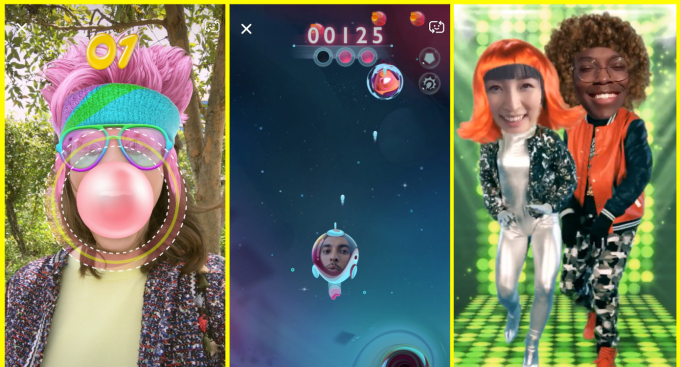Facebook builds its own AR games for Messenger video chat
Facebook is diving deeper into in-house game development with the launch of its own version of Snapchat’s multiplayer augmented reality video chat games. Today, Facebook Messenger globally launches its first two AR video chat games that you can play with up to six people.
“Don’t Smile” is like a staring contest that detects if you grin, and then uses AR to contort your face into an exaggerated Joker’s smirk while awarding your opponent the win. “Asteroids Attack” sees you move your face around to navigate a space ship, avoiding rocks and grabbing laser beam powerups. Soon, Facebook also plans to launch “Beach Bump” for passing an AR ball back and forth, and a “Kitten Craze” cat matching game. To play the games, you start a video chat, hit the star button to open the filter menu, then select one of the games. You can snap and share screenshots to your chat thread while you play.
The games are effectively a way to pass the time while you video chat, rather than something you’d ever play on your own. They could be a hit with parents and grandparents who are away and want to spend time with a kid…who isn’t exactly the best conversationalist.
Facebook tells me it built these games itself using the AR Studio tool it launched last year to let developers create their own AR face filters. When asked if game development would be available to everyone through AR studio, a spokesperson told me, “Not today, but we’ve seen successful short-session AR games developed by the creator community and are always looking out for ways to bring the best AR content to the FB family of apps.”
For now, there will be no ads, sponsored branding or in-app purchases in Messenger’s video chat games. But those all offer opportunities for Facebook and potentially outside developers to earn money. Facebook could easily show an ad interstitial between game rounds, let brands build games to promote movie releases or product launches or let you buy powerups to beat friends or cosmetically upgrade your in-game face.

Snapchat’s Snappables games launched in April
The games feel less polished than the launch titles for Snapchat’s Snappables gaming platform that launched in April. Snapchat focused on taking over your whole screen with augmented reality, transporting you into space or a disco dance hall. Facebook’s games merely overlay a few graphics on the world around you. But Facebook’s games are more purposefully designed for split-screen multiplayer. Snapchat is reportedly building its own third-party game development platform, but it seems Facebook wanted to get the drop on it.
The AR video chat games live separately from the Messenger Instant Games platform the company launched last year. These include arcade classics and new mobile titles that users can play by themselves and challenge friends over high-scores. Facebook now allows developers of Instant Games to monetize with in-app purchases and ads, foreshadowing what could come to AR video chat games.
Facebook has rarely developed its own games. It did build a few mini-games, like an arcade pop-a-shot style basketball game and a soccer game to show off what the Messenger Instant Games platform could become. But typically it’s stuck to letting outside developers lead. Here, it may be trying to set examples of what developers should build before actually spawning a platform around video chat games.
Now with more than 1.3 billion users, Facebook Messenger is seeking more ways to keep people engaged. Having already devoured many people’s one-on-one utility chats, it’s fun group chats, video calling and gaming that could get people spending more time in the app.
Contributer : Social – TechCrunch
 Reviewed by mimisabreena
on
Thursday, August 09, 2018
Rating:
Reviewed by mimisabreena
on
Thursday, August 09, 2018
Rating:















No comments:
Post a Comment